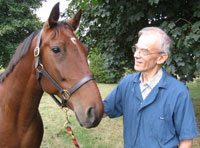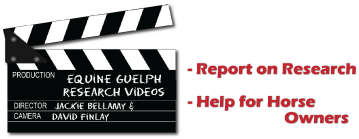Researcher Profiles
Dr. Keith Betteridge
 |
“Equine reproduction is a fascinating and important subject in its own right, and processes discovered in the horse shed light on other species, including humans.” |
So what has research done for the horse breeder lately? |
|
Why is this important?
Identification of changes in proteins and steroids during pregnancy could lead to new diagnostic tests of potential fertility and infertility. Also, a better understanding of the processes involved in nutrition and attachment of the conceptus during early pregnancy could contribute to finding ways to treat or prevent failed pregnancies in mares. This research may also shed light on human infertility problems.
| Dr. Betteridge discusses his research in our special feature REPORT ON RESEARCH |
|
Equine Related Hero:
There is a special mare named “Becky” who is one of the research horses in the OMAFRA/University of Guelph herd. Each year, she is the mare that gives the first embryo for equine reproduction research.
Current Horse Ownership:
“Worrying about 17 is more than enough!” exclaims Dr. Betteridge.
Degrees:
BVSc – University of Bristol
MVSc – University of Toronto (Ontario Veterinary College)
PhD – University of Reading
FRCVS – Royal College of Veterinary Surgeons
Position:
University Professor Emeritus
Responsibilities:
Dr. Betteridge’s collaborative reproduction research is focused on early pregnancy in the mare.
Area of Specialty:
Dr. Betteridge’s current area of study is early pregnancy in the mare. His research has been centred around embryos, embryo transfer and early pregnancy in farm animals, with his most recent work focusing on horses.
Research Related Goals:
Approximately 16% of pregnancies fail and about 60% of the failures occur within the first five weeks of pregnancy. His current research involves studying the role of the embryonic capsule during this critical stage of pregnancy. This research will assist in identifying the proteins involved in transporting nutrients to the embryo and attachment to the uterine lining. Studying the uterine proteins and steroid hormones in mares where pregnancy has failed may give insight into identifying potential diagnostic biomarkers of infertility.
Background:
Born in Lyndhurst (‘capital’ of the New Forest in Hampshire, where the ponies come from!), Dr. Betteridge received his early education in England. He earned two degrees in veterinary medicine – a BVSc from the University of Bristol in 1959 and a MVSc from the University of Toronto (Ontario Veterinary College) in 1961. Dr. Betteridge met his future wife while studying in Guelph. The Betteridges traveled back to the UK where Dr. Betteridge practised in a veterinary clinic specializing in large animals. Next, he returned to research, completing his PhD at the University of Reading while studying pig reproduction. After postdoctoral studies at the Medical School in Birmingham, Dr. Betteridge returned to his wife’s native Canada. From 1967-1980, Dr. Betteridge was employed by Agriculture Canada (Animal Diseases Research Institute). He then moved to Saint-Hyacinthe, Quebec to become the Director of the Centre of Research in Animal Reproduction at the Université de Montréal for six years. In 1986, Dr. Betteridge assumed a Research Chair at the University of Guelph and continued his studies on embryo transfer in farm animals. In 1996, Dr. Betteridge became a University Professor Emeritus and is currently enjoying his ‘retirement’ by continuing his studies on equine reproduction with 17 research mares at the Ontario Veterinary College. He continues to work with these animals to advance our knowledge in the area of reproductive biology.
Special Accomplishments:
Today, Dr. Betteridge is the Chairman of the International Equine Reproduction Symposia Committee, an organization that hosts world-renowned research conferences every fourth year.
Dr. Betteridge was elected as a Fellow of the Royal College of Veterinary Surgeons in 1993. That same year, he was honoured by the University of Guelph’s Equine Research Centre with its Award of Excellence. In 2003, Dr. Betteridge was the recipient of the Pioneer Award of the International Embryo Transfer Society.
